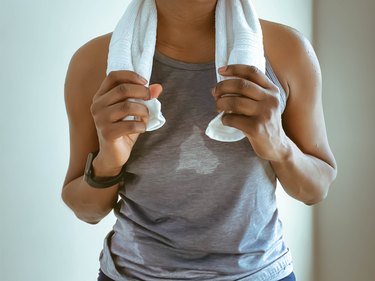
It's not hot and you're not running around. So...why are you sweating so much?
"Sweating can occur for many reasons," Marisa Garshick, MD, assistant clinical professor of dermatology at Cornell-New York Presbyterian Medical Center, tells LIVESTRONG.com. "While one of the most common is related to warm temperatures, sweating can also result from other causes."
Video of the Day
Video of the Day
If you're struggling to figure out the source, read on. Here are nine common (and not-so-common) reasons why you may be sweating more than usual, plus what you can do about it.
1. You're Anxious
Got a case of nerves? Feeling anxious or stressed causes your fight-or-flight response to kick in, sending your sweat glands into high gear, Dr. Garshick explains. (Your heart rate skyrockets too, which is why you get that pounding sensation in your chest.)
Fix it: One way to calm the response is by practicing deep breathing, according to Harvard Health Publishing. The simple practice of inhaling and exhaling fully and slowly can signal a near-immediate relaxation response that will help quell your racing thoughts, stabilize your heart rate and stop the sweating.
2. You're Going Through Menopause
Hormonal shifts that come with this major life change can cause a host of unwelcome effects. As people assigned female at birth get closer to menopause, the body's production of the hormone estrogen drops. Often, that results in hot flashes — sudden feelings of warmth around the chest, neck and face accompanied by heavy sweating.
It's common, too, for hot flashes and sweating to strike at night and cause sleep disruptions, according to the Mayo Clinic.
Fix it: Lifestyle changes and natural remedies for hot flashes like dressing in breathable layers, lowering the temperature of your bedroom at night and even carrying a portable fan may help you feel more comfortable when a sweat session strikes.
And prescription hormone therapy and the antidepressant paroxetine are effective at keeping hot flashes at bay to begin with, notes the National Institute on Aging (talk to your doctor about those).
3. You Didn't Cool Down Properly After Working Out
Sweat is par for the course while you're exercising as your muscles warm up and raise your body temperature. "Our body is designed to produce sweat to help us cool down and prevent overheating while working out," Dr. Garshick explains.
That sweating can continue for a period even after your workout is over, especially if you stop abruptly, when your muscles are still very warm.
Fix it: Dedicate a few minutes to winding down at the end of exercise, Dr. Garshick recommends. By giving your body a chance to transition from activity to rest, you'll encourage your muscles to cool down gradually and reduce the post-workout sweat.
4. You've Been Eating Spicy Food
A meal packed with heat can make you sweat. Capsaicin, a compound found in hot peppers, can temporarily raise your body's core temperature (and make your mouth feel fiery) when ingested. And when your temp goes up, your body works to cool you back down by sweating, according to research in the April-June 2015 issue of Temperature.
Fix it: The only way to steer clear completely is by avoiding the food, Dr. Garshick says. But if you don't want to give up the heat, applying a heavy-duty antiperspirant like Certain Dri Prescription Clinical Strength ($5.67, Amazon.com) can help minimize sweating while you eat.
5. You Have an Overactive Thyroid
Feeling inexplicably warm or sweaty with a rapid or irregular heartbeat and nervousness or irritability, trouble sleeping, shaky hands, mood swings and frequent bowel movements points to hyperthyroidism, a condition that occurs when the thyroid gland produces more thyroid hormone than the body needs, according to the National Institutes of Health (NIH).
Fix it: If you have symptoms of an overactive thyroid, see your doctor. The condition is usually easy to manage with anti-thyroid medications and beta blockers (avoiding certain foods can also help), but it can become life-threatening when left untreated, the NIH notes.
6. You Have Hyperhidrosis
Excessive sweating that's not related to heat, exercise or another underlying medical cause is often a sign of hyperhidrosis, when the body sweats more than necessary. People with hyperhidrosis tend to sweat the most from their palms, feet, underarms or head, according to the American Academy of Dermatology (AAD). Sometimes, the heavy sweating can trigger frequent skin infections like athlete's foot or jock itch.
Fix it: Applying a prescription-strength antiperspirant before bed and avoiding triggers (like caffeine, spicy foods or alcohol) can help keep the sweat under control, the AAD says.
Medications like prescription creams, nerve-blocking drugs, antidepressants and even Botox injections can also be helpful, notes the Mayo Clinic.
7. You Started a New Med
If you're suddenly more sweaty after beginning a new prescription, the drug could be to blame. Some medications used to treat depression, dementia, Parkinson's disease and chronic pain can trigger drug-induced hyperhidrosis, according to the International Hyperhidrosis Society.
Fix it: If you suspect a new med is causing sweaty side effects, bring it up with your doctor. In some cases your body could just need time to adjust, but it may be possible to adjust your dose or try another prescription, Dr. Garshick says.
8. You Have a Serious Infection
In rare cases, bacterial infections can trigger sepsis — a series of life-threatening reactions marked by rapid heart rate, shortness of breath, confusion, extreme pain, fever and sweating or clamminess, according to the NIH.
Sepsis typically stems from infections of the lungs, stomach, kidneys or bladder, but it can also develop from something as simple as an infected cut.
Fix it: If suspect that you or someone you know is showing signs of sepsis, seek immediate medical attention. Emergency medical treatment including antibiotics, oxygen and IV fluids are needed to get the infection under control, according to the NIH.
9. You Have a Medical Condition
Often the culprit behind heavy sweating is relatively benign and easy to address. But in rare cases, it could be triggered by a serious underlying medical condition such as tuberculosis, malaria, certain neurologic conditions or some cancers, according to the Mayo Clinic.
Fix it: If none of the causes above seem to fit your situation, see your doctor for a full evaluation.
When to See a Doctor
Lifestyle changes and using a heavy-duty antiperspirant are often enough to get excessive sweating under control. But Dr. Garshick says a call to the doctor is warranted if:
- At-home measures aren't working
- The sweating is interfering with your everyday life
- You suspect the sweating is caused by an underlying medical problem
Together, you can determine what's behind the sweating and decide on the best treatment plan based on your symptoms.
Related Reading
- Temperature. "Effect of capsaicin on thermoregulation: an update with new aspects"
- Harvard Health Publishing: "Relaxation Techniques: Breath control helps quell errant stress response"
- Mayo Clinic: "Hot flashes"
- National Institute on Aging: "Hot Flashes: What Can I Do?"
- National Institutes of Health: "Hyperthyroidism"
- American Academy of Dermatology: "Hyperhidrosis: Signs and Symptoms"
- Mayo Clinic: "Hyperhidrosis"
- International Hyperhidrosis Society: "Drugs/Medications Known to Cause Hyperhidrosis"
- National Institutes of Health: "Sepsis"
- Mayo Clinic: "Excessive Sweating"
Is this an emergency? If you are experiencing serious medical symptoms, please see the National Library of Medicine’s list of signs you need emergency medical attention or call 911.


